 Visit Elective Africa website Visit Elective Africa website
|


|
|
|
| Elective Africa Monthly Newsletter |
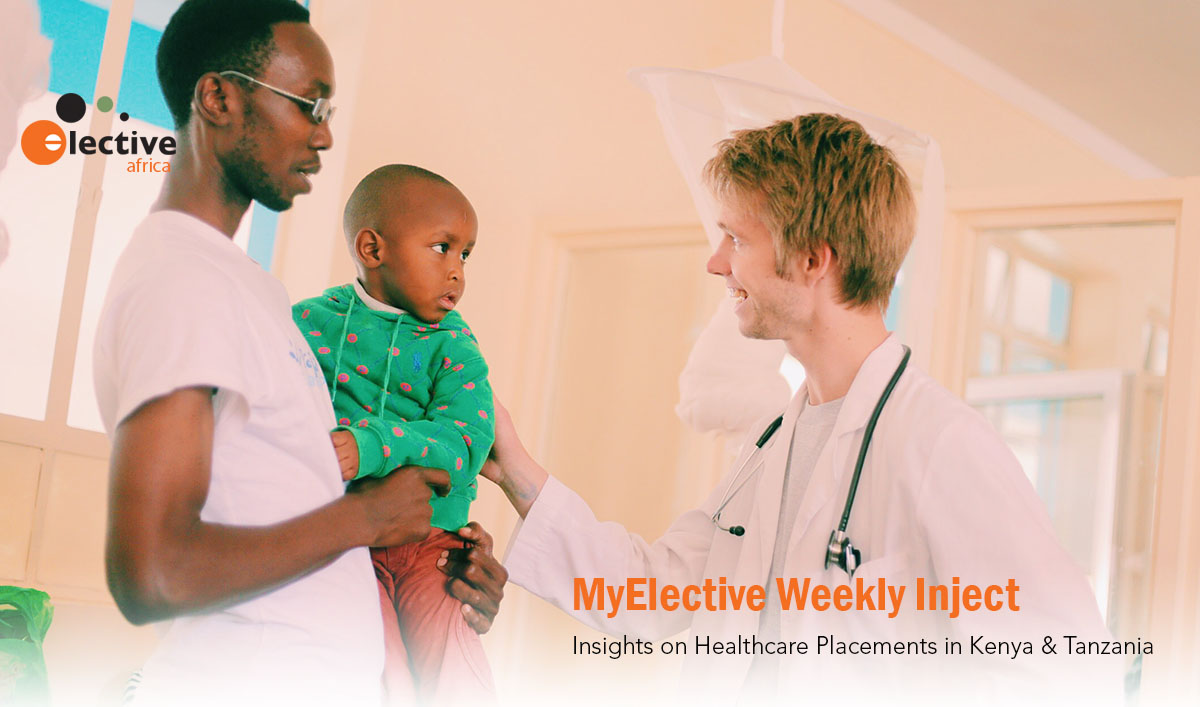 |
|
Welcome to our July Bulletin, its our hope you had a good June. Nurses are a very important part of the healthcare delivery team and they hold a very complementary role in the delivery of health services. In our first article we take you through the Nightingale Pledge of service by the nurses. Have a look at the daily log of one of our participants about their experience. As you plan to undertake an elective abroad, prepare to put a record of your experiences to advice others on your learning when you are back or even to give you talking point for the school admission. The clock is ticking and the eighth wonder is on course, get to learn about the great migration of the wildebeests across the Mara River. This is a great adventure of a lifetime that you may want to experience as you think of traveling abroad. Does traditional medicine have room in todays medical world? When the use of herbs is mentioned or even the famous Chinese acupuncture application in treatment of diseases what comes to your mind? Is it there effectiveness or how ineffective are they? Get to learn about the traditional medicine in Kenya and the hurdles facing it. Is there an area you would like us to focus on? Do you have a topic of interest that you would like to share with us? Reach out to us and speak about it. Back to top |
| The Nightingale Pledge |
 |
|
“I solemnly pledge myself before God and presence of this assembly; To pass my life in purity and to practise my profession faithfully. I will abstain from whatever is deleterious and mischievous and will not take or knowingly administer any harmful drug. I will do all in my power to maintain and elevate the standard of my profession and will hold in confidence all personal matters committed to my keeping and family affairs coming to my knowledge in the practise of my calling. With loyalty will I endeavor to aid the physician in his work, and devote myself to the welfare of those committed to my care.” At the end of a grueling training, all nurses take the Nightingale pledge as a commitment to serve humanity with dedication, professionalism and empathy. Yet, despite this cadre of healthcare being the most critical to service, rarely do they get the recognition they deserve. Three years ago, a gentleman I know, a young able-bodied man, was in hospital for six weeks following an accident in the football field that left him with three broken bones. He was admitted in hospital for emergency care and a series of surgeries to restore function to his bones. He was under the care of a fine orthopaedic surgeon who did a great job of restoring him back to near normal function, but he rarely saw him apart from during the morning ward rounds or when he was in the operating room. Over time, he realised that his care was heavily dependent on the instruction given by his surgeon being carried out by a host of other professionals with absolute precision and skill. The physiotherapists, the occupational therapists, the phlebotomists and the nutritionists all added value to his care. POINT OF NEED But the professionals he will never forget are the nurses. His most important revelation was that when you are single and your family is as small as his is, that is when you realise that even friends do not enjoy hospital visits. Prolonged stays are coupled with intense loneliness and boredom. His only source of sanity was the nurses. As a grown man who has taken care of himself for many years, he could not believe that an adult would serve him a bed pan and help with his ablutions without flinching, and that when he was in pain, the first word on his lips was ‘nurse’. Ill health will reduce even the mightiest of all to a point of need. As your doctor works to diagnose your illnesses and treat them, without your nurse, nothing moves. Nurses will dispense your medicines, give injections, ensure your comfort, encourage you in your pain, monitor you like a hawk when your systems are unstable, measure your fluids going in and out of your body, keep your wounds clean to prevent infections, hold your hand and wipe your brow when you are in labour and a host of other things that are not even defined in the book. The things a nurse will do for a patient, even a sibling, a spouse or a parent may balk at the thought of doing the same. Nurses are at the fore in defending patient rights. They are bound by their vow to maintain patient privacy. They advocate for the patient’s well being, they are the first on call for a patient by their continuous presence. They handle the patient’s medical, physical and emotional needs. They are family when no one is there, they are a shoulder to lean on when relatives lose their loved ones and they celebrate every single achievement for the patient on their long walk back to health. They are your parent, sibling and friend rolled into one. To the doctor, a nurse is the most important partner in the patient’s care. It is interesting how a great surgeon in the operating room will not function without a competent scrub nurse assisting in the surgery. This is the person who sets up the surgical tray, ensures all instruments are sterile, functioning properly and made available at the right time. Yet the patient will never even know the face of their scrub nurse. Palliative care is mainly nurse-driven. These nurses care for the patient in hospital and at home, relieving pain and discomfort and adding life into the days of patients with terminal illnesses. They hold the hands of their patients as they breathe their last, ensuring they do not die feeling neglected. They perform the final farewell care named the last offices before the body of the deceased is moved to the mortuary. SPECIAL NEED Nurses are the drivers of health campaigns, from health education, nutrition, immunization, cancer prevention, hygiene and sanitation and prevention of communicable and non-communicable diseases. This they do every day in their practice, in programmes and in their individual capacity in their neighborhoods. In Kenya, there are slightly over 54,000 nurses in practice, 30,000 of them in public healthcare. Nurses make up the largest health workforce (more than 50 per cent) in any health system as it is by virtue of their responsibility.The WHO recommendation for nurses and midwives is 3 per 1000 people. It is therefore glaringly obvious why overworking and demotivating this special cadre of health professionals is not in anyone’s interest. For every negative story we see about a nurse in the media, let us remember the untold positive ones that we never hear of. My special medal of honour for humility in service is reserved for a special nurse I met in 2005 when I was still in medical school. He worked in Keiyo, at a small dispensary and he was passionate about ensuring babies were vaccinated.For this reason, this man woke up every Monday at five o’clock, cycled seven kilometres on his bicycle, walked through rough terrain for five kilometres and took a matatu the last seven kilometres to the district hospital to collect vaccines for the week. He would then make this journey back to his dispensary to ensure the little babies never suffered polio or measles. He had to take this trip every Monday, as he had no electricity to keep the vaccines cold. He was not compensated for his journey and it never even occurred to him to ask. He was just serving his community. Wherever you are today sir, God bless your soul! Adopted from Healthy Nation(Kenya) Back to top |
| Hospital Placements Daily Activity Journal |
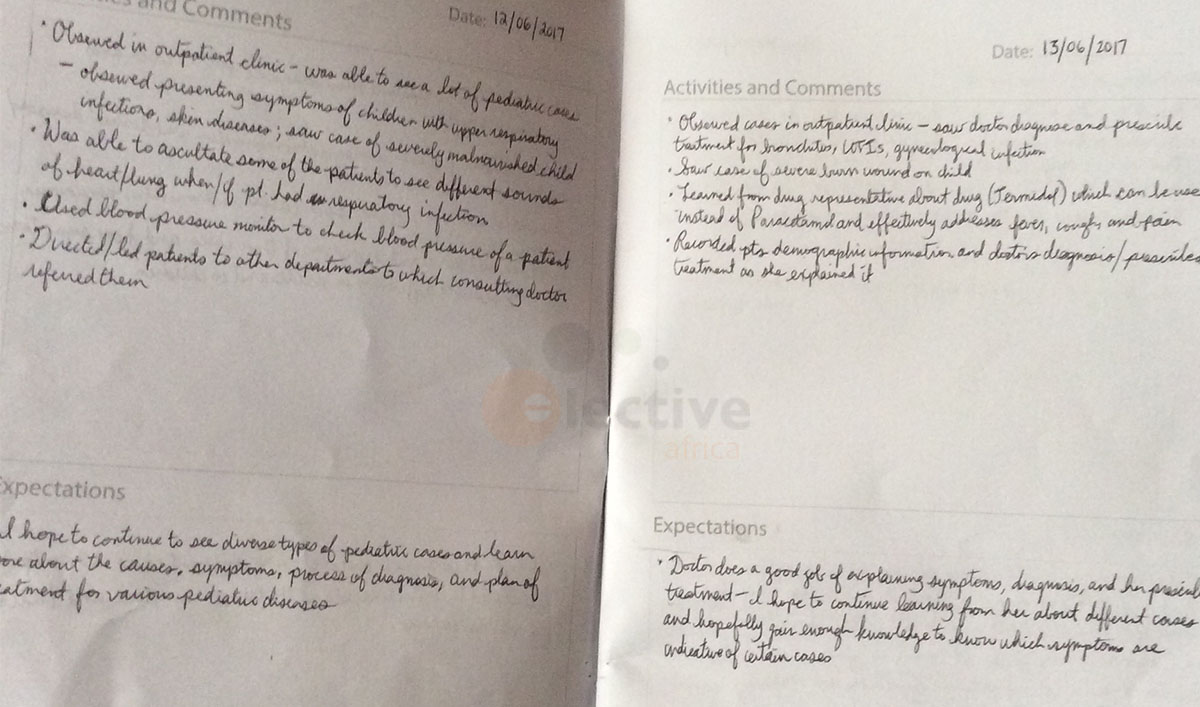 |
|
Capturing your moments of learning is a key way to develop talking points that signify intent to pursue your desired filled. While on program either for credit or for non-credit it’s important to capture your day-to-day experiences at the hospital. For those in their pre-health years awaiting is a period of application to graduate school which takes interviews and facing panels. In case you wonder how this looks; above is a sample of a filled log in the outpatient department of the hospital rotation for Amy Ado who is currently in our Arusha, Tanzania Location.
Back to top |
| The Great Wildebeest Migration |
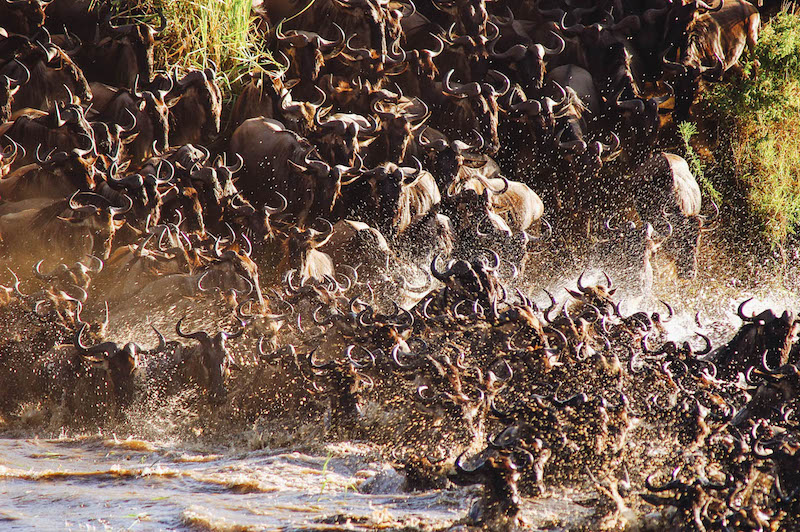 |
|
Ever watched the survivor series? Groups are forced to compete each other, outplay and outlast. One’s outwits determines whether they become the sole survivor. It is all about risking it all. The Survivor Series – Africa Edition has begun. Location of set; The Maasai Mara (in Kenya) and the Serengeti National Park(in Tanzania) which together form what no other reserve or park in Africa can! The protagonist being over one million wildebeest, antelope and zebra and antagonist played by carnivores namely lion, crocodiles, cheetahs, leopards etc. The sole survivor has to have all it takes to go through the 1000-kilometre trek. The migration has to cross the Mara River in the Maasai Mara where crocodiles will prey on them. This is one of the highlights as the animals try and cross the Mara River alive. In the Maasai Mara they will be hunted, stalked, and run down by the larger carnivores. The Maasai Mara also has one of the largest densities of lion in the world and is no wonder this is the home of the BBC wildlife channels Big Cat Diary. THE MIGRATION CYCLE Although the migration occur in a cycle between Tanzania and Kenya, most of the movement takes place in Tanzania, which covers Serengeti National Park, Ngorongoro Conservation Area, Loliondo Game Controlled Area, and Grumeti Reserve. In Kenya the migration stretches to the Maasai Mara Game Reserve, which borders Serengeti National Park in the north. Back to top |
| Track the Wildebeest |
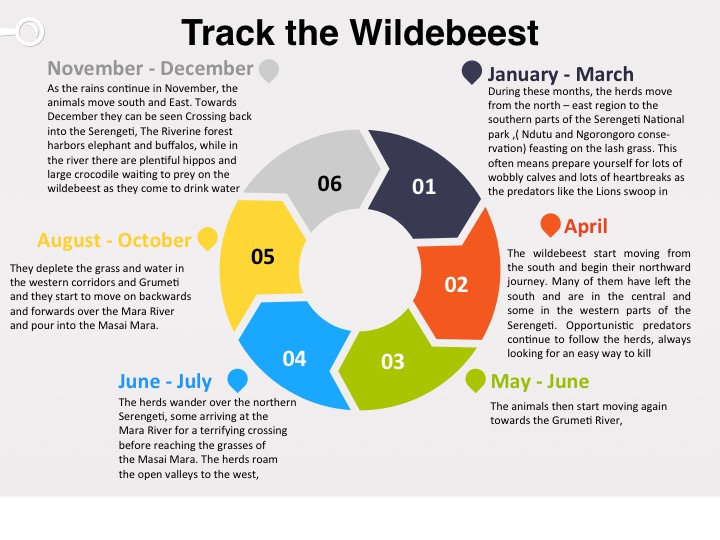 |
|
10 FACTS ABOUT THE GREAT WILDEBEEST MIGRATION THAT YOU DID NOT KNOW
Rated as one of the world’s most spectacular natural events and one of the seven wonders of the world; you can witness the amazing spectacle of the Great Migration on your tour in Kenya and Tanzania. Elective Africa’s Masai Mara Authentic Specials and Asili Tanzania Safari takes you there. Don’t miss this once in lifetime opportunity. Back to top |
| Traditional Medicine in Kenya |
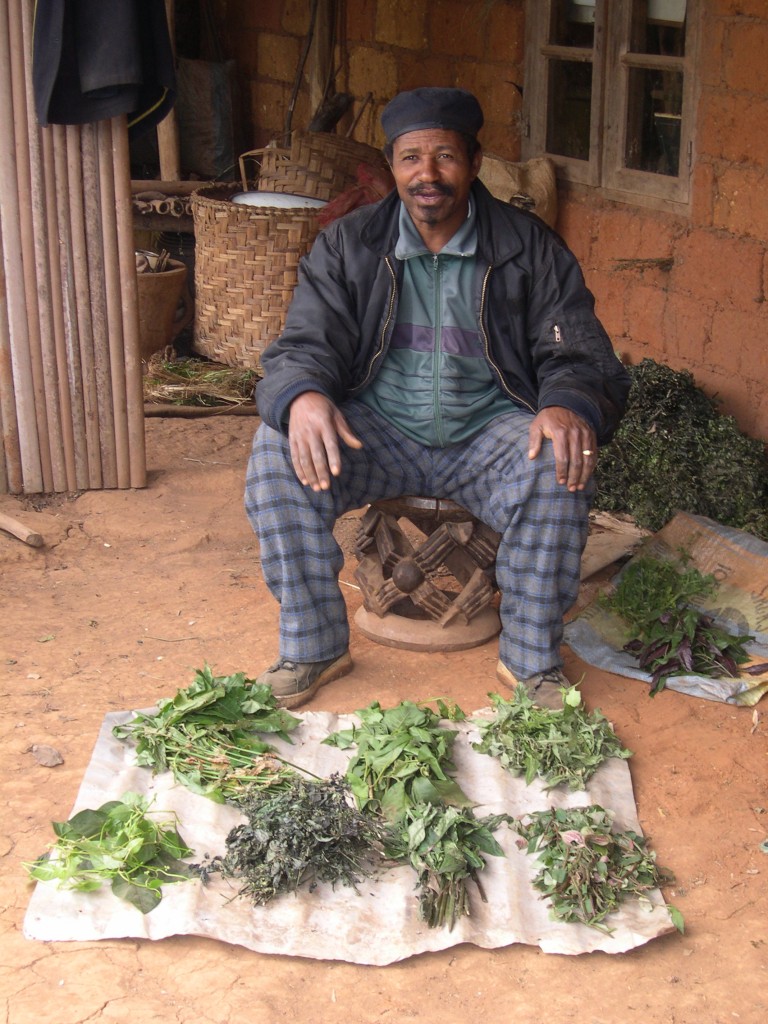 |
|
The World Health Organization (WHO) estimates that up to 80% of the population in some developing countries use Traditional Medicine. Trade in herbal medicine is also gaining acceptance globally and is now a lucrative business generating lots of revenue. In sub-Saharan Africa, the traditional healers still play a major role in the provision of healthcare. This has been attributed partly to inadequate unavailability of healthcare facilities and affordability (WHO, 2008; WHO, 2002) The traditional medicine is mostly manifest in the use of animal products and plants for medicinal purposes, a domain also referred to as Ethnopharmacology. The use of traditional medicine is often seen to follow the customs and believes of the community and with broad differences seen among the different communities. Though the aspects of traditional medicine have not been included in the modern medicare models, the limited resources particularly in the rural areas where most of the populations believe in the potency of the medication use it in combination with the modern medicine. In systems where the resources are limited the use of alternatives is key to delivery of care to all populations. Traditional medicine in Kenya has faced several hurdles and challenges for its inclusion. Some of them are; 1. Regulations TM was officially recognized in the 1990’s and the patent law was revised to include TM in 1999 (WHO, 2001), however in most of the Sub-Saharan countries very little has been done to constitute regulations that are in support of the Traditional medicine practice. The Pharmacy and Poisons Board in Kenya is the body mainly mandated to register the traditional herbalists but most of them who operate in rural areas are not aware of such. The absence of proper legislation and regulation of the practice also contributes to the presence of rogue practitioners who camouflage in lies and place the lives of the patients at risk 2. Social Cultural Barriers The practice of traditional medicine in the modern time is viewed as primitive especially by those that have access to the modern medicine, which is more patient, friendly and packaged properly in syrups tablets and capsules. This practice in Kenya was largely considered not a society affair but a family gifting passed on to the siblings. This has in recent past led to the lose of the skills as the elderly and often those well informed on this die off without imparting it on the children who instead focus on modern employments and other jobs for income. The sudden up rise in the chronic illnesses among the populations has led to the increased believe in the traditional medicine. 3. Herb Drug Interactions Patients suffering from the chronic conditions often use both the traditional medicine and the conventional medicine. The underlying theory being they want to get the much-desired cures. This is a particular challenge to traditional medicine and even reduces effectiveness as their interactions with other drugs may affect the pharmacokinetics and have adverse effects. More research is needed to ascertain these interactions as a way of rationalizing traditional medicine. 4. Research A research by All Africa ascertains the level to which traditional medicine research has been left out in research for health, which is coordinated in Kenya by KEMRI. The herbal medicine research in developed countries involves the screening of the herbal materials to ascertain the medicinal component in them. This may not be possible in developing countries because of the limited resources. A documentation of the plants used in treatments and the diseases they cure may be key to the utilization and the improvement of this medicine as a complimentary to the contemporary medicine. While the resources for healthcare provision are limited, there is opportunity in the use of the traditional medicine and herbal solutions in care delivery. Proper research and rising above these barriers is key in ensuring that the traditional medicine plays its role in the rising demand for health services. We are opening our programs to Naturopathic doctors and those interested in herbal medicine to learn on curative care within the hospital set up as well as experience the rural regions and the use of herbal medicine. Back to top |
| Open Slots for The Summer Period |
 |
|
Still thinking about your summer and contemplating a placement abroad? Worry no more we have a few slots remaining for the periods of June July August and September. Call us at +1 609 375 8912 or email us at info@electiveafrica.com to start off Back to top |
|
|

 7 2017
7 2017